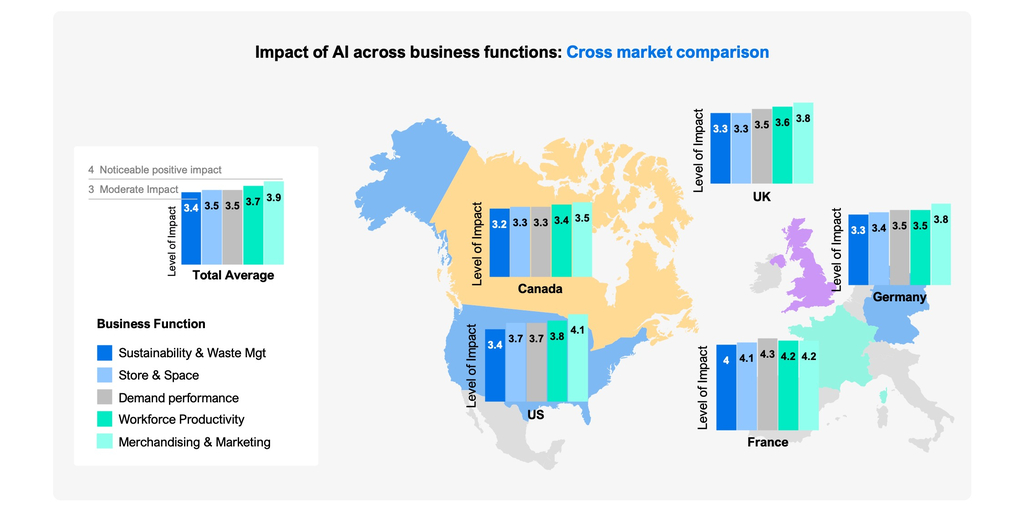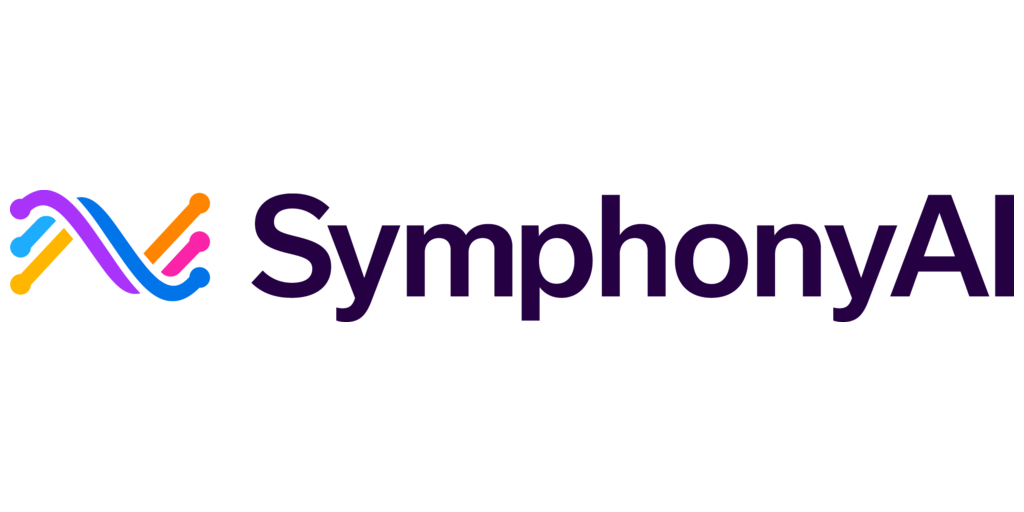Leading retailers increase profits by 39% and reduce carbon intensity by 21% over five years, thanks to AI and advances in connected retail.
LONDON AND PALO ALTO, Calif.–(BUSINESS WIRE)–Retail Economicsan independent economic research consultancy focused on the consumer and retail sector, and SymphonyAIleader in predictive and generative AI SaaS products for businesses, today released the results of new market research that shows the powerful business impact of AI adoption. The study warns that data silo barriers to AI adoption are preventing lagging retailers from realizing their transformation potential and highlights the importance of approaches such as SymphonyAI for Connected Retail for unify data and overcome operational silos to streamline decision-making and gain efficiency.
The research examined the impact of AI across all major areas of retail, including merchandising and marketing, demand performance, workforce productivity, stores and space , as well as sustainability and waste management. The study reveals that the world’s 200 largest retailers increased their pre-tax profits by 39.4% and revenues by 31.3% over the past five years, while reducing their carbon intensity (CO₂e produced per million of dollars of sales) by 20.9%. The study of more than 250 retailers in the UK, US, France, Germany and Canada found that these gains came from technology investments, including predictive and generative AI. AI-powered connected retail provides retailers with significantly increased operational efficiency, which increases profits and reduces carbon consumption.
Connected retail provides users with a seamless flow of AI-driven data and insights, empowering retail operations from the supply chain to the shelf. The Retail Economics study found that AI’s effectiveness in inventory management, route optimization and waste reduction supported profit growth while reducing carbon intensity. Food retailers experienced the greatest reduction in their carbon intensity, even as their profit margins increased. Grocers are using AI-powered inventory optimization to avoid overstocking or understocking fresh items and significantly reduce costly, carbon-intensive food waste.
Retailers believe AI’s impact on sustainability will accelerate over the next two years as they increasingly look to improve operational efficiencies, profitability and sustainability. Yet survey data reveals that the impact of AI on leading retailers’ business functions remains uneven, as retailers apply AI in isolated operational areas rather than integrating it across the board. supply chains and operations. Data quality and availability are the biggest barriers to AI adoption, with access to relevant, high-quality data a major issue across most retail functions.
Through the SymphonyAI Connected Retail Platform and AI SaaS products, retailers benefit from a seamless flow of data and insights that enable optimized decision-making across all aspects of retail operations, from supply chain to store shelves. SymphonyAI connected retail eliminates operational silos, so retailers can make fast, confident decisions without blind spots. Through a source-agnostic data integration framework, SymphonyAI for Connected Retail delivers AI-driven insights into critical functions including customer behavior, sales, promotions, assortment, inventory, supply chain, and real-time shelf and store conditions, enabling retailers to improve efficiency and effectiveness. profitability at all levels. This unified approach allows:
- Profit and revenue growth: Retailers using AI-powered tools benefit from optimized inventory management, accurate demand forecasting, and improved customer engagement.
- Sustainability gains: Food retailers using AI to reduce overstocking and waste have seen the greatest reductions in carbon intensity while increasing their profitability.
- Operational agility: Real-time information enables rapid and confident decision-making that adapts to changing consumer demands and market dynamics.
“Connected retail is essential for retailers seeking growth, profitability and reducing their carbon footprint,” said Dusan Rnic, senior vice president, international, SymphonyAI Retail-CPG. “Historically, retailers lacked the tools to unlock the connecting potential of all their functions due to data overload – which happens to be the essence of AI success. The potential of AI to improve efficiency, customer engagement and sustainability is not just a promise: it is now a reality and represents a crucial evolution in the retail journey. Retailers should consider unlocking the full potential of AI, not only to lead in today’s market, but also to support broader goals like sustainability.
Richard Lim, CEO of Retail Economics, added: “Leading retailers are demonstrating that investment in AI and technology can drive both profitability and sustainability. However, lagging companies risk missing out on the broader benefits of AI if they don’t prioritize data quality, systems integration and the right talent. By tackling these issues, retailers can achieve effective growth that supports ambitious sustainability goals in key markets.
The full report is available for download here.
About research
Audits of the world’s 200 largest retailers and consumer brands were conducted by Retail Economics using third-party data and proprietary models, assessing five-year trends in carbon emissions, profitability and revenue to to assess the relationship between financial and environmental performance.
Additionally, business surveys of over 250 retailers in the UK, US, France, Germany and Canada were conducted to understand the impact of AI, including priorities and challenges.
The research also questioned over 7,500 consumers in the same regions, providing shoppers’ perspective on AI-driven retail experiences and priorities.
Contributors: Nicholas Found and Richard Lim, Retail Economics.
About SymphonyAI
SymphonyAI is a leading enterprise AI SaaS company for digital transformation in the most critical and resilient growth industries, including retail, consumer packaged goods, finance, manufacturing, media and IT/business service management. SymphonyAI’s verticals count many leading companies among their customers. Since its founding in 2017, SymphonyAI has grown rapidly and today has 3,000 executives, data scientists and other talented professionals. SymphonyAI, Microsoft’s 2024 Business Transformation Partner of the Year – AI Innovation, is a SAIGroup company, backed by a billion-dollar commitment from successful entrepreneur and philanthropist Dr. Romesh Wadhwani. Learn more about www.symphonyai.com.
Contacts
Triple
Sarah Armstrong






